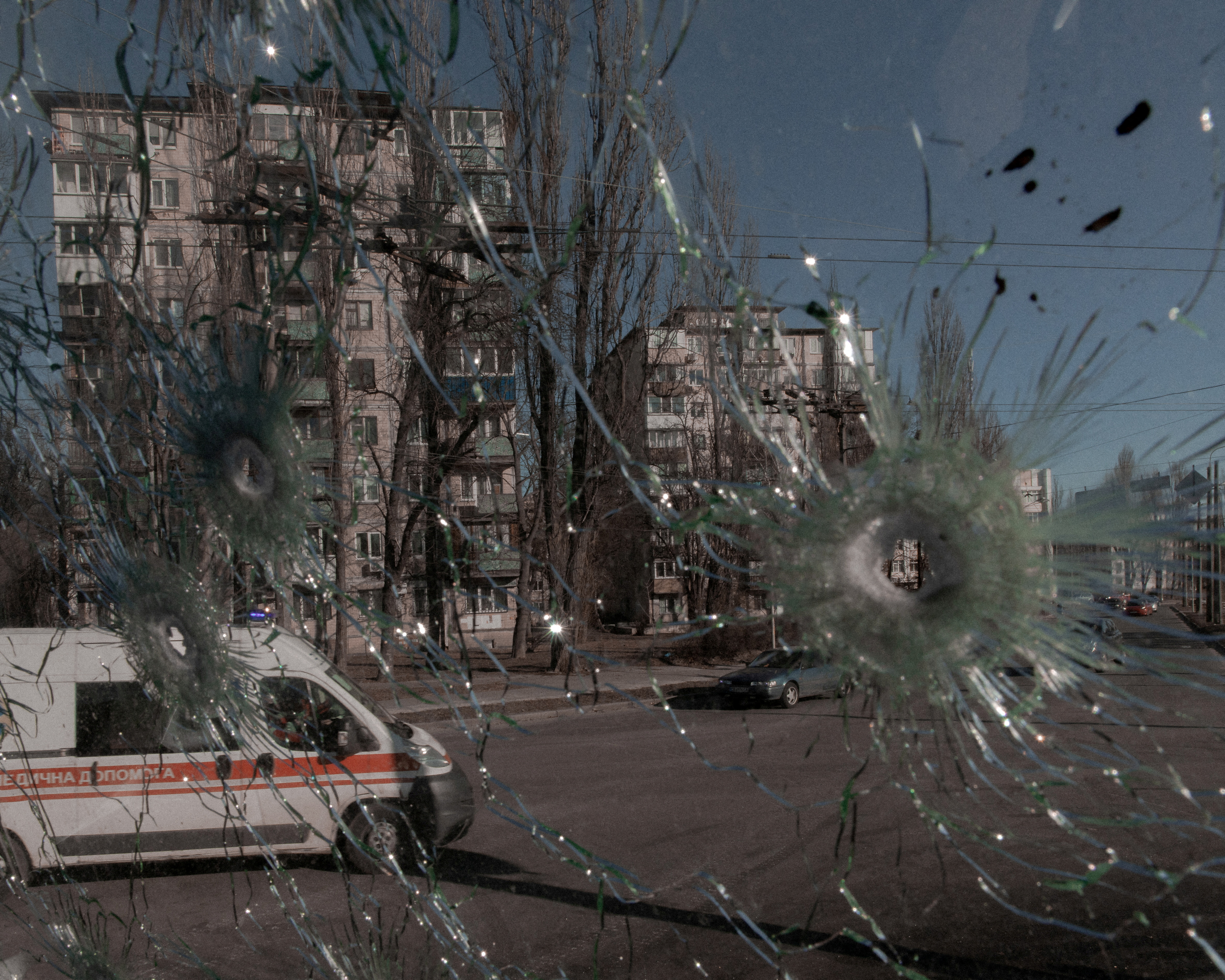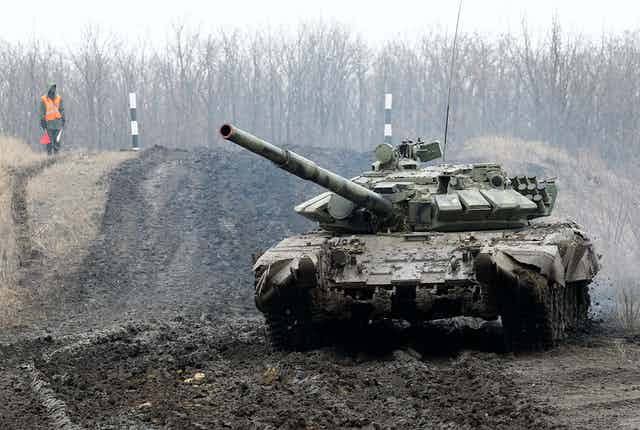KYIV, March 1 (Reuters) – Russia warned Kyiv residents to flee their homes on Tuesday and rained rockets down on Kharkiv, as Russian commanders who have failed to achieve a quick victory shifted their tactics to intensify the bombardment of Ukrainian cities.
With an armoured column miles long bearing down on the capital, Russia’s defence ministry said it was planning to strike targets in Kyiv used by Ukraine’s security service. Residents near such sites should evacuate their homes, it warned, while giving no information about where in the city of 3 million people those targets were located.
Rocket strikes on Kharkiv killed at least 10 people and wounded 35, Ukrainian Interior Ministry adviser Anton Herashchenko said. Similar strikes had killed and wounded dozens in the city the previous day.
“The rubble is being cleared and there will be even more victims and wounded,” he said. Ukrainian President Volodymyr Zelenskiy said the artillery barrages on Kharkiv amounted to state terrorism.
Nearly a week since Russian troops poured over the border, they have failed to capture a single major Ukrainian city after running into far fiercer resistance than they expected.
“The Russian army is an artillery army primarily, and it looks like they are shifting into war-fighting mode,” said Nick Reynolds, a land warfare analyst at RUSI in London.
“The failure of the Russians to achieve their goals quickly has galvanized Ukraine resistance to them. Really what we are seeing now is the Russian military shifting gears.”
Russia still has more forces to throw into the fight even though President Vladimir Putin faces worldwide condemnation and international sanctions.
Oil company Shell became the latest big Western firm to announce it was pulling out of Russia. The sanctions and global financial isolation have already had a devastating impact on Russia’s economy, with the rouble in freefall and queues outside banks as Russians rush to salvage their savings.
Russia’s TASS news agency reported new peace talks would be held on Wednesday. Talks between Russian and Ukrainian officials held on Monday at the Belarus border failed to reach a breakthrough. Ukrainian foreign minister Dmytro Kuleba said Kyiv was ready to talk but would not just follow Russian ultimatums.
Zelenskiy’s government remained in control of Kyiv with soldiers and civilians ready to fight invaders street by street.
Pictures released by U.S. satellite company Maxar showed Russian tanks, artillery and fuel trucks stretching for 40 miles (60 km) along a highway to the north.
“For the enemy, Kyiv is the key target,” Zelenskiy, who has remained in the capital rallying Ukrainians, said in a message overnight. “We will neutralise them all.”
Some Kyiv residents have been sheltering in underground metro stations at night. There are long lines for fuel and some products are running out in shops, but by day the city is still holding out, with a semblance of ordinary life on the streets.
In the south of the country, Russia claimed to have completely encircled Ukraine’s Azov Sea coast. If confirmed, that would mean Russian forces invading from Crimea had joined up with separatists in the east and had cut off Ukraine’s main eastern port, Mariupol.
Ukrainian authorities also reported 70 soldiers killed in a rocket attack in a town between Kyiv and Kharkiv.
Zelenskiy, addressing the European Parliament by video link a day after he signed an official request to join the European Union, urged the bloc to prove that it sided with Ukraine.
“Do prove that you will not let us go. Do prove that you are indeed Europeans and then life will win over death and light will win over darkness. Glory be to Ukraine,” he said in an emotional speech.

In Moscow, Russian Defence Minister Sergei Shoigu said the Kremlin would press its military operation in Ukraine until it achieves its goals. It aimed to protect itself from threats created by the West and was not occupying Ukraine, he said.
Foreign Minister Sergei Lavrov told a Geneva disarmament meeting via video link that Ukraine had been seeking nuclear weapons. Dozens of diplomats walked out of the hall in protest as his speech began.
Britain’s defence ministry said in an intelligence update that the Russian advance on Kyiv had made little progress in the past 24 hours, probably due to logistical problems. But it also warned of a shift in Russian tactics that could worsen the plight of civilians.
“The use of heavy artillery in densely populated urban areas greatly increases the risk of civilian casualties,” it said.
When the Russian forces first crossed into Ukraine last week, Western countries thought Moscow wanted to quickly topple Zelenskiy’s government and install new leaders. But Ukrainians have shown no sign of willingness to surrender, while Russia’s lightning assault became mired. Zelenskiy remains unbowed.
“Looking at the Russian operation so far, they’re having tremendous problems with logistics and communications. The whole effort seems shambolic,” tweeted Michael Kofman, an expert on the Russian military at Washington DC’s Wilson Center.
Kharkiv, a mainly Russian-speaking city of 1.5 million people near the Russian border, has borne the brunt of attacks since Monday.
Human rights groups and Ukraine’s ambassador to the United States have accused Russia of using cluster bombs and vacuum bombs, weapons condemned by many organizations.
Ukraine’s general staff said Russian losses included 5,710 personnel, 29 destroyed and damaged aircraft and 198 tanks, all figures that could not be verified.
Russia has not given a full account of its battlefield losses, but pictures from Ukraine have shown burnt-out Russian tanks and bodies on the road where they have been attacked by Ukrainian defenders.
More than 660,000 people, mostly women and children, have fled Ukraine to neighbouring countries such as Poland and Romania, the U.N. refugee agency said.
At the Hungarian border crossing Tiszabecs, a mother cradled a baby in her arms after a four-day drive from Kyiv.
“I saw war, I saw rockets,” said her older son Ivan, 15, who looked exhausted and pale after the journey. His father had stayed behind to fight.
At the United Nations, the General Assembly met ahead of a vote to isolate Russia, deploring Moscow’s “aggression against Ukraine” and demanding its troops stop fighting and withdraw.
Putin’s Russia faces near total international isolation, with the notable exception of China, over his decision to launch what he called a “special military operation” to disarm Ukraine and capture “neo-Nazis and drug addicts” that lead it.
Most effective so far have been sanctions on Russia’s central bank that prevent it from using its $630 billion foreign reserve war chest to prop up the rouble. The currency recouped some losses on Tuesday after hitting a record low on Monday.
Russia announced a ban on Tuesday on foreign companies selling assets to try to halt the flight of Western companies abandoning their Russian ties.
Want to send us a story? Contact Shahidi News Tel: +254115512797 (Mobile & WhatsApp)


